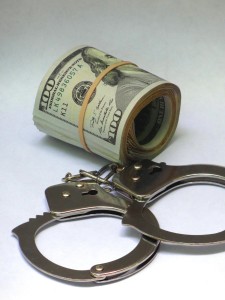Theft Crimes
Theft charges in Virginia can be misdemeanors or felonies, depending on the value of property taken or the type of offense. The most common Virginia theft charges include Larceny, Shoplifting, Receiving Stolen Property, Embezzlement, Check Offenses, Unauthorized Use, Robbery, and some Burglary and Breaking and Entering Charges.
Larceny
Larceny in Virginia is taking another person’s property with the intent to permanently deprive the person of his property. Larceny is basically theft, and most Virginia theft crimes are charged as Petty Larceny or Grand Larceny. However, there are a number of other crimes that are “deemed larceny,” meaning they are punished the same was as Virginia Larceny charges.
Petty Larceny in Virginia is theft of property valued at less than $1,000. Va. Code §18.2-96 makes Petty Larceny a Class 1 misdemeanor, punished by up to 12 months in jail and a fine up to $2,500.
For more information on Virginia Petty Larceny charges, click here.


Grand Larceny in Virginia is theft of property valued at more than $1,000. This charge is found in Va. Code §18.2-95. It is punished with 1-20 years in prison and a fine up to $2,500.
For more information on Virginia Grand Larceny charges, click here.
For more information on Larceny charges in Virginia, click here.
Shoplifting
Shoplifting in Virginia (Va. Code §18.2-103) is another form of Larceny. Shoplifting occurs when an offender conceals goods while in a store, takes possession of goods, alters the pricetags on items, or transfers goods from one container to another with the intent to permanently deprive the owner of the property. Assisting another person in any of these acts can also result in a Shoplifting charge. If the items are worth less than $1,000, the offense is punished as Petty Larceny. If the items are worth $1,000 or more, the offense is punished as Grand Larceny.
For more information on Shoplifting charges in Virginia, click here.
Receiving Stolen Property
Receiving Stolen Property in Virginia is considered Larceny of that property. The offender faces the same punishment as if he or she actually stole the property. The offender will be charged with a Class 1 misdemeanor if the property was valued at less than $1,000. This offense will be punished the same way as Petty Larceny. If the property was worth more than $1,000, he or she will be charged with a felony and it will be punished the same way as Grand Larceny charges.
For more information on the charge of Receiving Stolen Property in Virginia, click here.
Embezzlement
Embezzlement in Virginia (Va. Code §18.2-111) occurs when an offender wrongfully takes property entrusted to him by another person. Embezzlement usually occurs in employment or other fiduciary relationships when the offender misappropriates money or property that he is handling in the course of a trust relationship. Embezzlement is punished the same way as Larceny in Virginia. Embezzlement charges in Virginia can be misdemeanors or felonies.
For more information on Virginia Embezzlement charges, click here.
Check Offenses
An offender can be convicted of issuing a bad check under Va. Code §18.2-181 if he or she makes, draws, utters, or delivers a check with knowledge of insufficient funds in the account, writes a check on a non-existent account, or writes a check on a closed account.
Issuing bad checks in Virginia under Va. Code §18.2-181 is considered a form of Larceny and is punished the same way. The crime is a misdemeanor or a felony depending on the value represented on the check. It is a misdemeanor if the value represented on the check is less than $1,000. If the value is more than $1,000, the offense becomes a felony.
For more information on crimes involving issuing and passing bad checks in Virginia, click here.
Unauthorized Use
Unauthorized Use in Virginia under Va. Code §18.2-102 is taking another person’s property without consent with the intent to temporarily deprive the owner of his or her property. The only property covered under this statute is animals, aircraft, vehicle, boat or other vessel. If the value of the goods is less than $1,000, the Unauthorized Use charge is a misdemeanor. If the value is more than $1,000, it is a felony.
For more information on Virginia Unauthorized Use charges, click here.
Robbery
Robbery in Virginia (Va. Code §18.2-58) is the taking of property from another person by violence or intimidation. Robbery charges in Virginia are punished with 5 years up to life in prison. Use of a firearm in the commission of a robbery is a separate offense (Va. Code §18.2-53.1) with a mandatory minimum prison sentence which must be served consecutively with any punishment for the robbery conviction.
For more information on Robbery charges in Virginia, click here.
For more information on Use of a Firearm in the Commission of a Felony, click here.
Burglary and Breaking and Entering
Burglary and Breaking and Entering in Virginia criminalize entering property with intent to commit certain crimes.
Burglary
Burglary in Virginia (Va. Code §18.2-89) is breaking and entering a dwelling house of another person at night with the intent to commit a larceny or felony. Burglary under Va. Code §18.2-89 is punished with 5-20 years in prison and a fine up to $100,000. Using a firearm to commit a burglary makes the offense a Class 2 felony, punished with 20 years up to life in prison.
For more information on Burglary in Virginia under Va. Code §18.2-89, click here.
For more information on what is considered a deadly weapon in Virginia, click here.
Breaking and Entering
Breaking and Entering charges in Virginia differ from Burglary because certain Breaking and Entering offenses can be committed during the day or night, and apply to both dwelling houses and other structures. There are several Breaking and Entering charges in Virginia that have their own specific intents.
Breaking and Entering with Intent to Commit Rape, Robbery, Murder or Arson (Va. Code §18.2-90) occurs by entering a dwelling house at night, breaking and entering during the day, or entering without breaking and concealing oneself during the day with the intent to commit one of the listed offenses. It is punished with 5-20 years in prison.
For more information on Breaking and Entering with Intent to Commit Rape, Robbery, Murder or Arson under Va. Code §18.2-90, click here.
Breaking and Entering with Intent to Commit Larceny, Assault and Battery, or Another Felony (Va. Code §18.2-91) not mentioned in Va. Code §18.2-90 is committed by entering at night, breaking and entering during the daytime, or entering and concealing oneself during the daytime with the intent to commit one of the listed offenses. It is punished with 1-20 years in prison.
For more information on Breaking and Entering with Intent to Commit Larceny, Assault and Battery, or another felony, click here.
Breaking and Entering a Dwelling House with Intent to a Commit a Misdemeanor Other Than Assault or Trespass (Va. Code §18.2-92) during the day or night when the dwelling house is occupied with the intent to commit one of the listed offenses is a Class 6 felony, punished with up to 5 years in prison and a fine up to $2,500.
For more information on charges of Breaking and Entering a Dwelling House with Intent to Commit a Misdemeanor, click here.
Bank Burglary (Va. Code §18.2-93) is committed by entering a banking house during the day or at night with the intent to commit larceny and the offender is armed with a deadly weapon. Bank Burglary is punished with 20 years up to life in prison. If the offender robs the bank (takes money or property by force) during the bank burglary, he can be charged with, and convicted of, both Bank Burglary and Robbery.
For more information on Bank Burglary in Virginia, click here.
If the offender was armed with a deadly weapon when he or she committed a Breaking and Entering offense, it will be charged as a Class 2 felony, punished with 20 years up to life in prison.
Virginia Theft Charges Have More Consequences Than Prison and Fines
Virginia theft charges need to be taken very seriously. Convictions for a Virginia theft charge, like other Virginia convictions, cannot be expunged. Even a misdemeanor can affect someone’s employment or educational opportunities. Convictions for Virginia theft crimes can also have serious immigration consequences if the offender is not a United States citizen.






